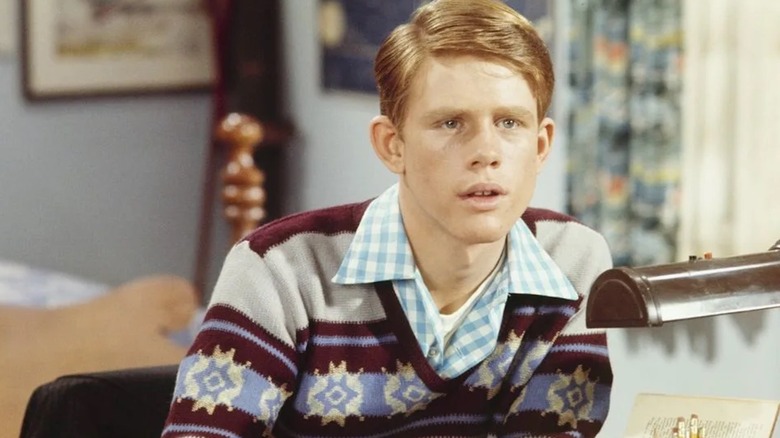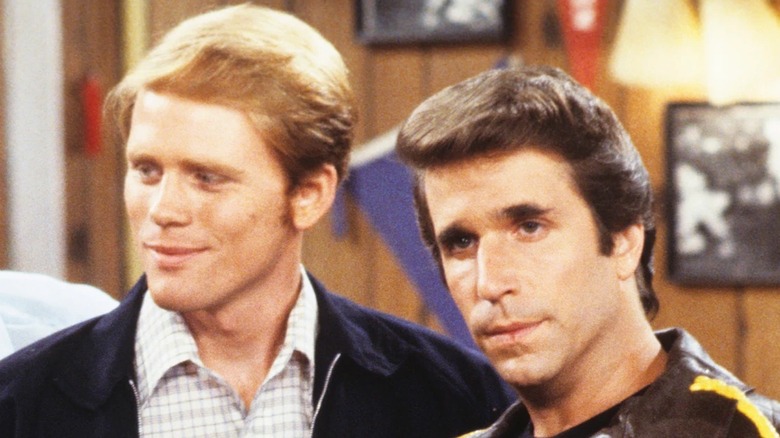When Garry Marshall’s “Happy Days” premiered on ABC in 1974, the sitcom caught a ride on a wave of Baby Boomer nostalgia generated by George Lucas’ “American Graffiti” the previous year. That film was like a time machine for this generation, and they wanted to keep going back over and over again. Alas, this being the pre-VCR and pre-cable age, if they were looking to take that nostalgia trip at home, they were going to be waiting a couple of years for its network television premiere. So Marshall’s series, which looked and sounded a good deal like “American Graffiti,” was a more than suitable substitute.
Advertisement
Aside from sharing its theme song (Bill Haley and His Comets’ “Rock Around the Clock”) with Lucas’ film, “Happy Days” also cast one of the stars of “American Graffiti,” Ron Howard, as its protagonist. Unlike most of the show’s young cast, Howard wasn’t some fresh-faced newcomer; many Boomers had grown up watching him play little Opie Taylor on “The Andy Griffith Show.” So it was a thrill to watch him come of age as Richie Cunningham in an era they longed to revisit.
“Happy Days” nearly lost that connection when Howard threatened to quit the show after its second season. He was perturbed that the network wanted to foreground the series’ breakout character, Arthur “Fonzie” Fonzarelli (Henry Winkler), in order to reverse its sudden ratings slide (caused by going head-to-head with the immensely popular “Maude” spinoff “Good Times”). Fortunately, Winkler himself was cool to the idea of the show being retitled “Fonzie’s Happy Days,” so the change didn’t happen and Howard stuck around.
Advertisement
Nevertheless, Howard was growing more and more ambitious with each passing year. Evidently, he didn’t make his restlessness known to ABC execs, because they were caught completely off guard when he announced he was leaving the show after season 7.
NBC’s Fred Silverman swooped down and swiped Ron Howard from ABC
According to a 1980 article in the Mansfield News Journal, Howard’s departure was motivated by ABC’s refusal to let him get more involved in the show off-camera. Per Howard, he was unhappy with “ABC’s unwillingness to really let me get into the production area as deeply as I wanted to — they see me pretty much as Richie. They didn’t take me very seriously.”
Advertisement
This was a total own goal on ABC’s part. Howard had already directed one feature in 1977 (the Roger Corman-produced “Grand Theft Auto”), and was not shy about discussing his eagerness to direct again. So when former ABC executive Fred Silverman offered Howard a decent chunk of change to join him at NBC, the actor bolted “Happy Days.” It was an attractive deal for Howard, if only because Brandon Tartikoff, the president of NBC Entertainment, took him much more seriously than the folks at ABC did. “Howard does it all and does it extremely well as creator, actor, producer and director,” Tartikoff told the AP.
How did ABC feel about this? As one unnamed exec told the News Journal, “It was like those legends you hear when an eagle swoops down and snatches a baby from the cradle and flies off.” The series did a quick retool by adding Ted McGinley to the cast as Mrs. Cunningham’s nephew Roger. While McGinley’s a terrific actor (as you know if you’re watching Apple TV+’s “Shrinking”), he didn’t mesh well with Winkler, Anson Williams, and Donny Most. “Happy Days” managed to stay on the air for four more seasons after Howard left, but people mostly watched it out of habit.
Advertisement
As for Howard and NBC, he appeared in three made-for-TV movies, but, for whatever reason, he never got to direct one of them. When he satisfied the terms of his contract, he quit television and directed the R-rated comedy “Night Shift” starring Winkler and a brash, hilarious newcomer named Michael Keaton. The film was a hit, and Howard’s filmmaking career was off and soaring. Solana Token Creator









